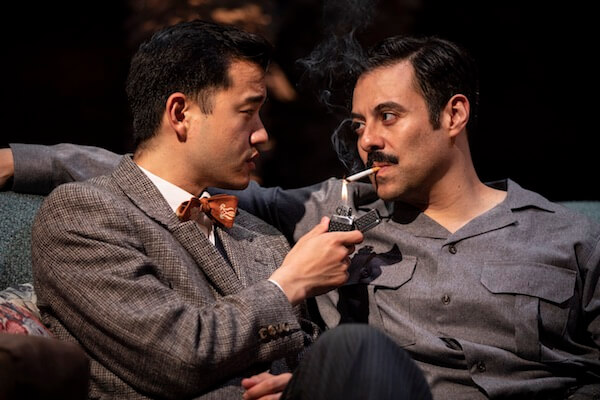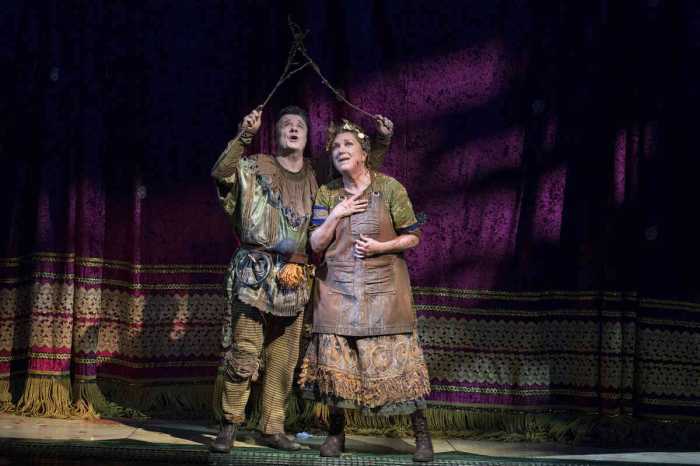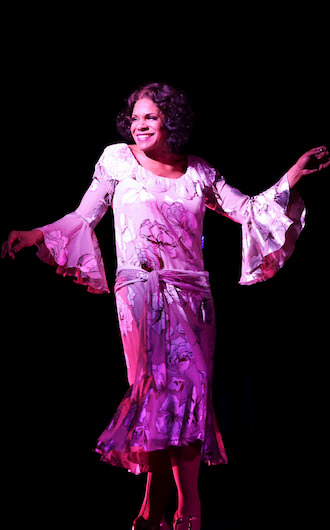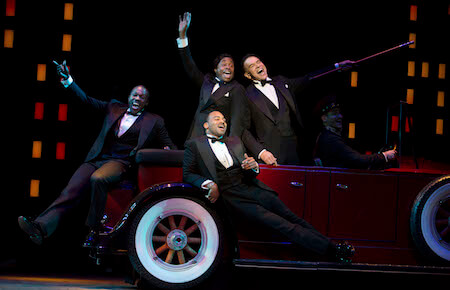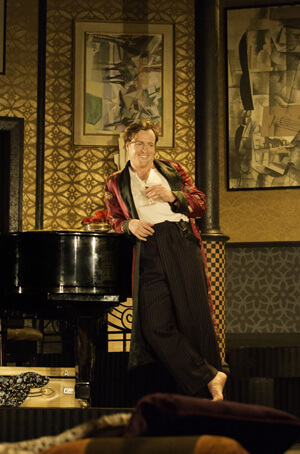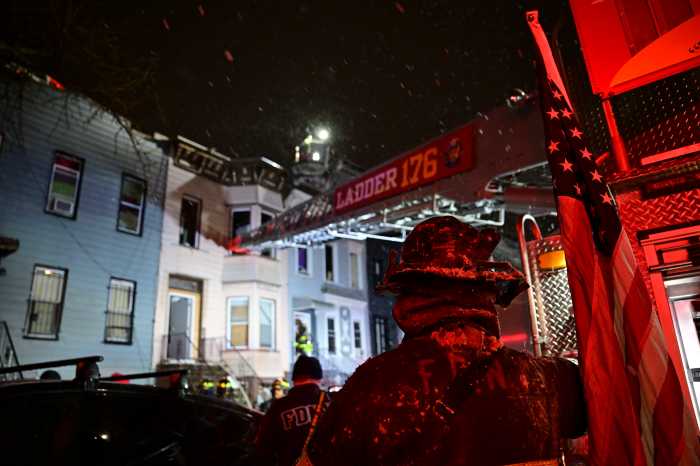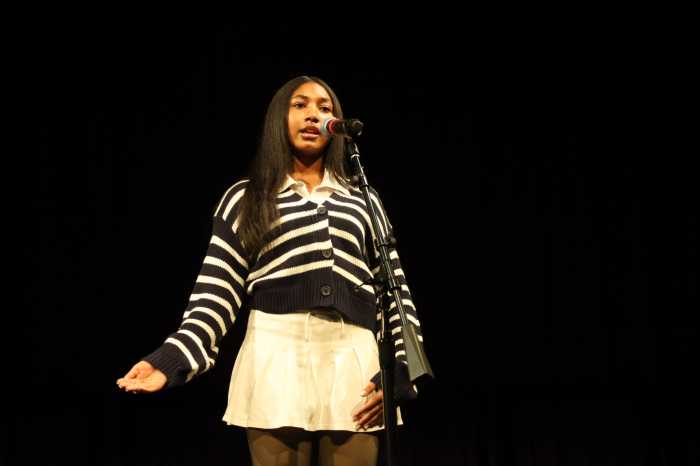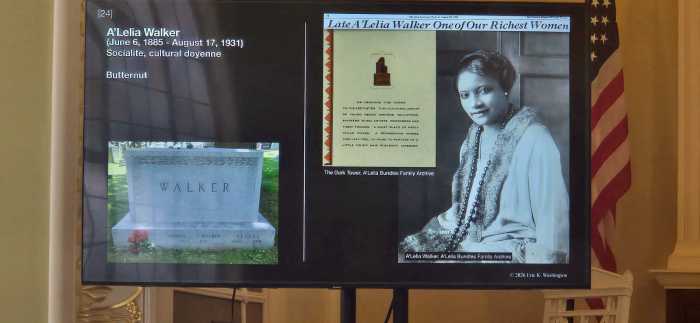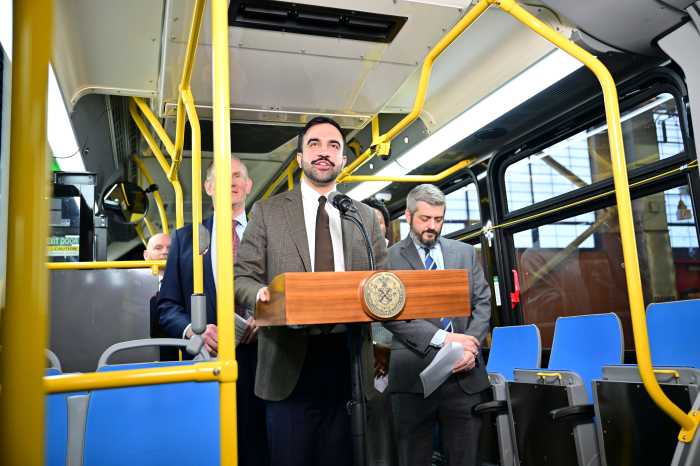Patrick Kerr, Scarlett Strallen, Dan Butler, Seth Numrich, Opal Alladin, Peter McDonald, Sara Topham, and Tom Hollander in the revival of Tom Stoppard’s“Travesties,” directed by Patrick Marber, at the American Airlines Theatre through June 17. | JOAN MARCUS
Does art serve any purpose? For Tom Stoppard, a prodigious linguistic artist, the answer, not surprisingly is an unqualified yes. Nowhere could that be more clear in than in the effervescent, exciting, and thoroughly engrossing revival of his 1974 play “Travesties” now at Roundabout. If you have even a cursory love of language and wordplay and how they can be transformed into delicious comedy, you will curse yourself if you miss this gem.
This rollicking, super-smart comedy is narrated by one Henry Carr, a real-life clerk whose only claim to fame was that he once sued James Joyce for the destruction of a pair of trousers in an amateur production of “The Importance of Being Earnest.” (This also gave him a cameo in Joyce’s “Ulysses.”) The play is told as Carr’s memory, filtered through creeping dementia, of a time in Zurich during World War I when he was an observer of the interactions among Joyce, Lenin, and the Dadaist Tristan Tzara, who had all embraced Switzerland’s neutrality to seek refuge from the battle. Carr, on the other hand, had seen battle and had been released due to injury.
The play is written in the comic, bon mot-rich style of “Earnest,” and even includes characters named Gwendolyn and Cecily. Its arguments about art and social upheaval are bracingly serio-comic and, as directed by Patrick Marber, “Travesties” has a manic physicality that makes the whole enterprise dazzling fun.
Comedy and drama in three very male-centric plays
The cast is sublime. Tom Hollander is fantastic, a pure comic genius who effortlessly surmounts the challenge of burnishing his role in the undertakings that are all out of his memory. Peter McDonald is a tremendous Joyce, all reservation and slow burn — until he works some surprising and delightful magic. Dan Butler is suitably grim and prone to outbursts as Lenin. Seth Numrich is delicious as Tristan Tzara, constantly enlivening the proceedings and making Dadaism seem simultaneously a response to a world gone made and ridiculous.
Amidst all the fun are serious questions about war, social revolution, and art. The intellectual gamesmanship keeps you on the edge of your seat. In the end, though, we learn two things, which both come, trenchantly, from Carr. First he says that wars are fought to “make the world safe for artists,” meaning that regimes must not tamp down expression. Second, that “art doesn’t change society. It is merely changed by it.” Not surprisingly in Stoppard’s telling, the theater is in the thick of that change.
Denial, despair, rage, nihilism, fleeting hope, and buckets of alcohol are ingredients in the toxic house cocktail special for all the denizens of Harry Hope’s bar in “The Iceman Cometh.” Like any signature drink, though, it needs to be mixed just so, or, as Harry himself complains as he finds himself unable to knock himself out, the elixir loses its power.
David Morse, Denzel Washington, and Colm Meaney in George C. Wolfe’s new Broadway production of Eugene O’Neill’s “The Iceman Cometh,” at the Bernard B. Jacobs Theatre through July 1. | JULIETA CERVANTES
While George C. Wolfe’s new Broadway production of Eugene O’Neill’s play starring Denzel Washington gets most of it right, the production lacks the cohesion needed to enroll an audience in the emotional life of the characters or the spiritual landscape of the bleak redoubt where they indulge each others’ pipe dreams and hide from the world. When favorite fellow drunk Theodore Hickman arrives for his much-anticipated annual visit — he treats them all to free drinks — he is a changed man, preaching the power of honesty as the path to redemption. Old habits die hard, and Hickey is met with anger and suspicion that, thanks to his skill as a salesman, gives way to evangelical zeal and hope, only to collapse into failure when the savior is revealed as a fraud.
O’Neill’s play is a classic American drama and aptly contemporary in its skewering of anesthetized souls too willing to buy the cons of a cynical snake oil salesman. Wolfe’s production delivers that part of the story and there are some fine performances, but it comes off as a series of isolated set pieces. That may be the intention, especially in a production presented with the judicious cutting this one has. After all, each of the men live in their own lonely realities, but with performances that mostly exist in isolation — the actors never really connecting — the resulting choppiness undermines the accumulation of sustained tension, keeping the audience at a distance, observing and not engaged. We go with Hickey’s ability to sell his program of peace and redemption because that’s what the script says, but we never see the moments when Hickey infects these men, however briefly, with a vision of change.
The cast of fine Broadway actors deliver solid performances. David Morse as Larry Slade, is Hickey’s nemesis, a former anarchist who lost faith in the movement. Austin Butler is Don the young man who was raised in, but fled, the movement and has sought out to Larry for a measure of peace the older man cannot provide. Colm Meaney is a blustering, damaged, and fragile Harry Hope, and there are fine turns as well by Danny McCarthy, Reg Rogers, Bill Irwin, and Danny Mastrogiorgio.
Every actor who has the nerve and stamina to try the role of Hickey gives it his own take. Washington’s Hickey is so infused with his egoism that he can’t see the corruption at his core. Timely, that. His final monologue, played facing the audience, shows us a man in the depths of mental illness, grappling with morality — and it is one of the production’s simplest and most powerful dramatic statements. So powerful that the only relief for the other drunks is the return to denial and inebriation that are the antidote, poisonous though it may be, to Hickey’s brand of salvation.
For all its disjunction, this production does do one thing brilliantly over its nearly four hours: it reminds us of the dangers of a world where post-truth exists and self-delusion is as corrosive and debilitating as pickling oneself with rotgut or giving credence to pipe dreams.
There are several surprises in the play “The Gentleman Caller,” Philip Dawkins’ new play getting its premiere at the Abingdon Theatre Company — none of them good. It imagines meetings between the playwrights Tennessee Williams and William Inge in 1944 when Inge was a critic with a St. Louis newspaper and Williams was about to debut “The Glass Menagerie” under the title “The Gentleman Caller.” The first surprise is the similarity to Terry Teachout’s play “Billy and Me,” also about the relationship between the playwrights, which has not, to my knowledge, been performed in New York. While Teachout’s first act imagines Inge visiting Williams in Chicago for the opening of his play, that’s Dawkins’ second act. Dawkins’ first act is about the two writers meeting at the deeply closeted Inge’s apartment, ostensibly for an interview.
Daniel K. Isaac and Juan Francisco Villa in Philip Dawkins’ “The Gentleman Caller,” directed by Tony Speciale, at the Cherry Lane through May 26 only. | MARIA BARANOVA
Okay, good ideas are good ideas. The second surprise, though, is that despite its questionable originality, Dawkins’ play isn’t very well constructed. It’s overly talky and opts for the facile quip rather than an engaging scene. There is speculation, but no extant proof, that Williams and Inge were lovers, so Dawkins has to imagine a lot of the give-and-take, and it’s remarkably pedestrian, despite the one-liners. The first act opens with a long monologue by Williams setting the stage. (Teachout had a third character, a narrator, to do this job.) Williams then steps into the action, meeting Inge. After a few pleasantries and Williams saying that he desperately needs the press, Inge assaults Williams, which, given how closeted he is, is another surprise. Williams, however, has very expansive views of sex and seems willing to engage if it will get him his interview — and he doesn’t get too drunk first. After a lot — a lot! — of talk and a few laughs, we’re treated to some playwright-on-playwright sex as the lights go down.
Act Two opens in Williams’ hotel room after Inge has seen the play. There’s a lot of banter and Inge fawning all over Williams, Williams wanting a quickie, a prolonged observation of lesbians having sex in a window across the street, and a lot more talk. The play ends with Inge on the bed, ripping apart the play of his he’d given to Williams in Act One while Williams gives us another long monologue tying up the loose ends and leading to Inge’s suicide.
Director Tony Speciale does what he can with this. A lot of the action is invested in pouring drinks and fumbling almost-sex. Inge’s final act of apparently randomly ripping apart his script on Williams’ hotel bed while in the presence of his idol makes no dramatic sense.
Actors Juan Francisco Villa and Daniel K. Isaac do what they can with Williams and Inge, respectively, but the script gives them nothing more than one-note characters — and so Villa comes off overblown and Isaac underplayed.
Dawkins apparently wanted to write a play about the freedom to be gay, not be bound by the heteronormative, and remind us that it wasn’t always so. At least that seems to be a point in Williams’ last, rambling monologue. But since this conclusion is not justified by anything that has gone before, it’s no surprise the evening falls flat.
TRAVESTIES | American Airlines Theatre, 227 W. 42nd St. | Through Jun. 17: Tue.-Sat. at 8 p.m.; Wed., Sat. at 2 p.m.; Sun. at 3 p.m. | $59-$252 at roundabouttheatre.org or 212-719-1300 | Two hrs., 30 mins., with intermission
THE ICEMAN COMETH | Bernard B. Jacobs Theatre, 242 W. 45th St. | Through Jul. 1: Tue.-Fri. at 7 p.m.; Sat. at 1 & 7:30 p.m.; Sun. at 2 p.m. | $79-$199 at telecharge.com or 212-239-6200 | Four hrs., with two intermissions
THE GENTLEMAN CALLER | Cherry Lane Theater | 38 Commerce St. btwn. Barrow & Bedford Sts. | Through May 26: Tue.-Sat at 8 p.m.; Sat. at 3 p.m. | $67 at web.ovationtix.com or 212-924-2817 | Two hrs., 15 mins., with intermission

